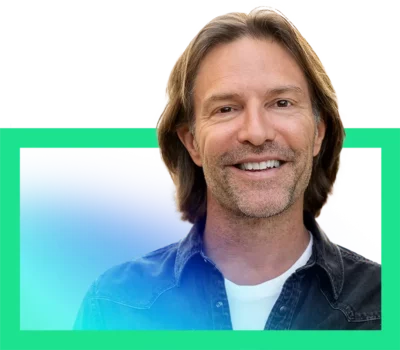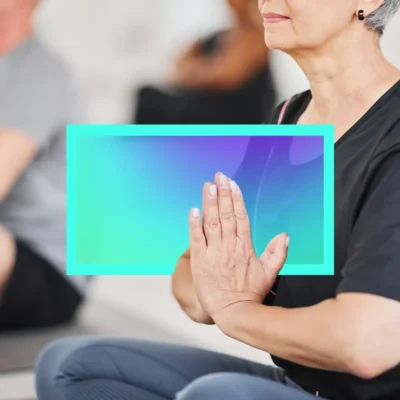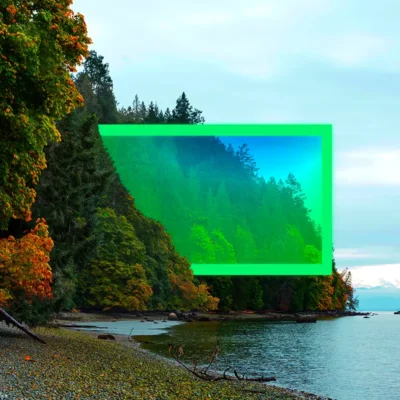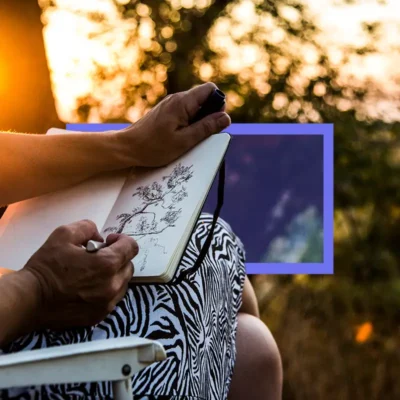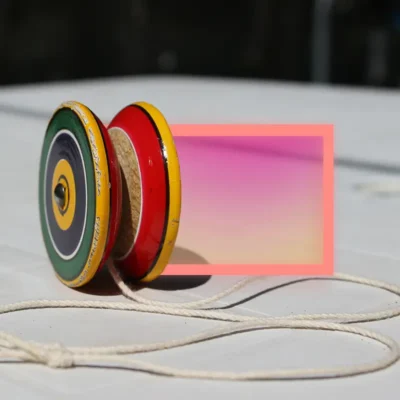To swim in a sea of stars
Choral music composer and conductor Eric Whitacre directs choirs around the globe, but as a kid in northern Nevada, he feels like the black sheep. He doesn’t know how to channel his endless energy to create meaningful connections or find his place in the world. His remarkable experiences with outer space, multi-part harmonies, and a (literal) leap of faith teach him crucial lessons about embracing what lights him up to be his true self.
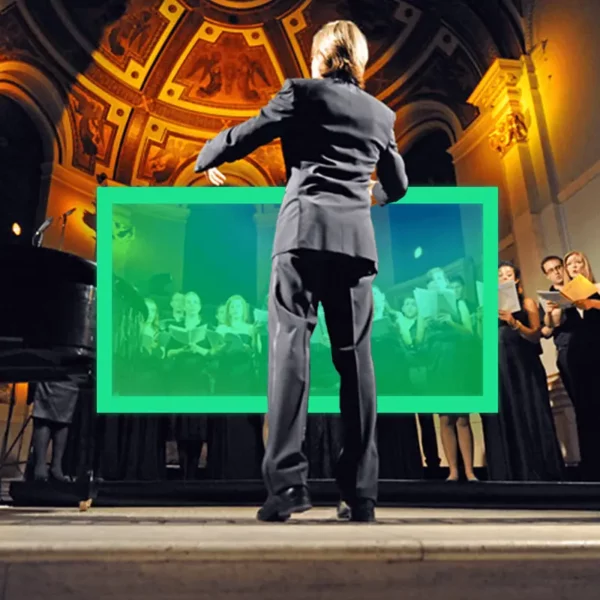
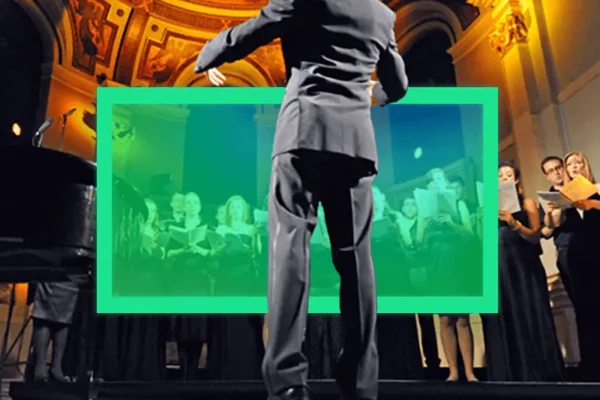
Table of Contents:
Transcript:
To swim in a sea of stars
ERIC WHITACRE: My friends continue walking along the broken concrete, and I gaze over the edge of the dam at the water 20 feet below. Everything — the motion of swaying tree branches, the voices of my friends — falls away. It’s only me and the water. It’s so much bigger than me. It’s beautiful. And I want to be a part of it. I’m not considering the danger, or the overwhelming power, only that I’m pulled toward this force of nature.
ROHAN GUNATILLAKE: Choral music composer and conductor Eric Whitacre has directed choirs around the globe and won Grammy awards for his work, but as a kid in northern Nevada, he always felt like the odd one out in his family. He didn’t know how to channel his endless energy to create meaningful connections and find his place in the world. In today’s episode, Eric shares the story of how he learned to find the thing that lights him up, and in doing so, he becomes his most authentic self.
In this series, we combine immersive first-person stories, breathtaking music, and mindfulness prompts so that we may see our lives reflected back to us in other people’s stories. And that can lead to improvements in our own inner lives.
From WaitWhat, this is Meditative Story. I’m Rohan, and I’ll be your guide.
WHITACRE: My home of Northern Nevada is a world of big skies and open deserts.
On this January night, my breath turns into a misty cloud in the cold, crisp air. The sharp smell of sagebrush lingers on the breeze as I walk across the dry ground behind my family’s house.
My head tilts up. The night sky is so clear it’s like I’m swimming in a sea of stars. Everywhere I look, there’s thousands and thousands of points of light.
I plant my new reflector telescope in the ground. The cold metal chills my fingertips. The telescope doesn’t have any modern gadgetry, so I have to find stars the old fashioned way: with a big book of charts. I search for the Seven Sisters, a cluster of stars which, to the naked eye, look like a single celestial body. I go back and forth between studying the book and peering through the lens, making adjustments.
The sound of voices echoes through the still night, and I look back towards our house. There’s a warm glow from the front window. Inside, my parents and siblings get ready for bed. I’m outside looking in. Relishing the silence.
I’m the black sheep in my family. I have these interests that become obsessions — like dungeons and dragons, computer science, and now, space. I get fixated, almost consumed, by things I find interesting. And so, I end up spending a lot of time alone. In some ways, my fixations make me special. But by being special, I stand out; I stand apart. I feel like I see the world differently than most of the people in our small town. I play mystical games in my head with numbers and symbols. If I see a bird flying or the wind blowing a particular way, I’ll attribute meaning to it. I just think, and think, and think about these things. And I sometimes get the impression that sharing these thoughts with other people is a bad idea.
At school, I’m separated from the rest of my peers in all kinds of ways. I’m placed in a program for academically talented kids. For certain classes, I’m bumped up a few grades. I think it’s supposed to encourage me to learn at a higher level, but it just makes me feel different.
I let out a long breath and turn back to my telescope. I squint my eyes, and there they are. The Seven Sisters! The solitary smudge in the inky black night is, in fact, seven separate stars, glowing brightly, billions and billions of miles away.
I take a step back. I’m weak in the knees. It’s beautiful. Standing out here alone in the night, I’m deeply aware of this thing that’s so much bigger than myself. I feel connected to this larger force and to myself. I don’t know what it is, but I’m compelled to seek out this feeling, again and again.
It’s late spring, and the vast northern Nevada sky is a brilliant robin’s egg blue. Two of my friends and I have scrambled to the top of an old dam. It’s where teenagers in our town sneak away to hang out. Most of the old dam has fallen away, and a massive stream of water flows fiercely through its ruin.
I’m a senior in high school, and I’m an extroverted ball of energy. Like an electron, bouncing from here to there, fast talking, making jokes. By all accounts, I’m popular. I still feel like I see the world differently, but now I have a wild, untethered confidence. And a real problem with authority.
This is the side of me most people see, but it’s just one side of who I am. I have an internal life that I don’t share outwardly. While my friends see the most dazzling version of my personality, they wouldn’t know that I spend most of my time brooding. I pick things apart. I feel this need to question why things are the way they are. I can’t help myself. And I ruminate, combing over every choice I’ve made and will make. Quietly mulling over things.
I don’t actively share this side of myself. It’s one thing to be a tornado of outward energy, always breaking down obstacles rather than retreating. And it’s another to admit how deeply I feel things, how I see a mysticism in the world around me. I still worry about being different. I want to be accepted. To be loved.
My friends continue walking along the broken concrete, and I gaze over the edge of the dam at the water 20 feet below. I find wonder and ecstasy staring at the sunlight reflecting off the moving water. And the sound of it: it’s more than a wall of white noise; it has depth, and structure. To me, it’s an ancient and powerful language. I feel like I understand it.
The water mirrors how I feel inside: turbulent. I have all this forward momentum and outward exuberance, and below the surface, a quiet, dark current. That combination can feel like dissonance in my own body, but it’s expressed so effortlessly in the water. Everything — the motion of swaying tree branches, the voices of my friends — falls away. It’s only me and the water. It’s so much bigger than me. It’s beautiful. And I want to be a part of it. I’m not considering the danger, or the overwhelming power, only that I’m pulled toward this force of nature.
Without thinking, I jump.
The fall takes an eternity. When I hit the surface, feet first, I sink fast. There’s a churn, and I’m thrown into a cyclone of water. It’s louder than I imagined, and even bigger than I’d understood. Literally and metaphorically, I’m in over my head. My lungs fill with water. I’m tossed around like a ragdoll. My back scrapes along the bottom of the river. I become desperate.
Finally, the current throws me to the surface. Popping out of the river knocks the water out of my lungs. I cough and spit up everything I can. My friends scramble down to me, their faces panicked. They help me up onto the bank. I lie there, in disbelief, having come so close to death.
Why did I jump? I can’t fully explain it. I didn’t want to hurt myself. I just have this instinct to leap into whatever I find fascinating and beautiful. To push myself to learn, regardless of the danger. The intensity of the experience at the dam shakes me. But soon, I find myself drawn back to the power I felt emerging from the water. I’m still looking for something. Something that can give me that feeling, and make me feel connected, alive, and fully me.
GUNATILLAKE: Has there ever been something you’ve done in your life which you couldn’t explain at first? And only over time did you manage to unpick its meaning. Bring that memory to life here, softening with it.
WHITACRE: I clutch my score with sweaty palms. The small, basic music rehearsal room is hot and stuffy. The rest of the college choir stands around me. About 100 singers all make small talk. They’ve been rehearsing together for weeks.
Today is my first day with them. And I can’t believe I’m here. Music has been one of my obsessions for a long time, but I’ve always bristled against the formalism and structure of performing in school. Of having anyone tell me the right or wrong way to express myself. Until now, my only exposure to choral music has been watching a group of singers in high school perform. They wore Henry the 8th costumes and sang Renaissance music. It was the nerdiest thing I’d ever seen, and not something I thought I could ever be caught doing.
And yet, throughout my first few weeks here at the University of Nevada, I found myself drawn to the music building, unable to resist the pull. The choir director, David, kept telling me, “Come to a choir rehearsal. I think this is something for you.” Finally, I agree.
“Let’s do warmups,” says David. At once, the singers around me jump into lip trills. I feel my face flush. This choir thing is going to be as embarrassing as I’d feared. I just started college; I can’t have people see me doing this.
David steps up to the podium and says, “Let’s sing the Kyrie from the Requiem by Mozart.” What’s a Kyrie? I don’t have time to find out. David lifts his arms, there’s a breath, and then boom. The basses all around me begin to sing. Then the altos, then the sopranos, and then the tenors. Kyrie eleison, they sing. Voices float around me and through me and above me. The harmonies create a vibration that envelops me. The different lines dance together in three-dimensional counterpoint. My brain lights up like a Christmas tree. I’m overwhelmed by the complexity and humanity on display. The craft and the beauty of it, the pure beauty. It makes my heart want to cave in.I’m reminded of my nights looking up at distant stars through my telescope. I’m reminded of the pull I felt towards the turbulent water in the dam. Throughout my life, I’ve been drawn to things that give me this fleeting feeling of connecting to something larger than myself. But here, standing in this choir, letting my voice ring out and join others in harmony, I feel a connection that is more immediate and resonant than any before. My passion is shared by everyone in this room. I’ve found my tribe. These are my people. I feel electrified. Open. I fit in here. As myself. My whole self.
Singing in this choir is like standing in the middle of a cosmic Swiss watch. Unlike the wonders of nature, somebody made this music. A living, breathing person who ate food, who wore pants. Someone like me. I feel the thrilling possibility of creating these worlds with the singers around me. Not just seeking out connection, but actively creating it.
I run my fingers over the ivory keys of the piano at my grandmother’s house. It’s felty and out of tune, but it’s the piano I grew up playing. The deep familiarity calms me. I sit at the bench, my feet resting on the soft carpet, and look through the window at the snow falling quietly outside. I’m 24 years old, and it’s been 6 years since my first ever choir practice. Now, I compose choral music of my own.
I want to write a piece of music for an old professor of mine. Someone who encouraged me to follow the path that led me to being a composer. I want to thank him. I turn, as I sometimes do for inspiration, to poetry. I reach for a book of poems by the Mexican poet Octavio Paz, a gift from a composition professor. It’s a small paperback, and when I open the book, the poems in the original Spanish are on the left, and translated to English on the right.
GUNATILLAKE: We don’t know how Octavio Paz intended for his audience to hear his words. But we do know that we can be better receivers when our faces are soft, our back and energy bright and upright, our attention open and relaxed.
WHITACRE: I open it to a random page, to a poem called Water Night, and read the English translation:
If you open your eyes, night opens doors of musk,
The secret kingdom of the water opens
Flowing from the center of the night.
And if you close your eyes,
A river, a silent and beautiful current, fills you from within
Flows forward, darkens you
Night brings its wetness to beaches in your soul
I feel these words so deeply. I scramble for a pencil and manuscript paper and start scribbling down notes as fast as I can, almost like I’m taking dictation. A piece of music floods out of me, from my innermost self onto the page.
As I write, an idea emerges — a 14-part harmony. I pause. It’s unorthodox. I realize asking a chorus to sing in 14 different parts may make it difficult for this to ever be performed. But knowing that this piece is a gift for a mentor, an articulation of my gratitude and who I am, liberates me to write exactly what I want to express.
I finish the composition in 45 minutes. It’s the fastest I’ve ever written a piece of music. I feel like I’ve harnessed the sense of awe that comes over me when I’m immersed in something larger than myself. The night sky, the dam — now, I’m not just a witness to this feeling, I’m creating it. Every note I put on the page feels like the truest expression of who I am. I’m not worried about being different. I feel pure acceptance of my true self. I’m not worried about whether this will be received well by some future audience; this piece isn’t intended to dazzle or excite or impress. This music — it’s deep, it’s dark, it has all the notes from sorrow to melancholy to ecstasy. It’s me.
The murmur of the crowd dies down as I cross the stage at Union Chapel in London. It’s a spectacularly beautiful 19th-century church that’s been turned into a concert space. It’s a little melted on the inside, so the stained glass, the wood, everything is old enough now that it feels a little rock and roll. It’s musty, it’s damp, but at the same time, it shimmers with the light of hundreds of flickering candles.
I’ve been a professional composer and conductor for 25 years. The choir standing before me tonight is about to sing: Water Night, the piece I wrote as a thank you, the piece that sums me up the most.
As a conductor, I perform with my back to the audience. I don’t worry about presenting myself a certain way, or living up to an expectation. I focus all my attention on the musicians, on the work we will do together to bring this music to life.
I take a breath. The singers mirror me. We breathe not just at the same speed and volume, but with the same emotional intention. It’s extraordinary — there’s a magical quality to it. As a group, we are instantly unified. Terabytes of emotional information pass back and forth between us.
The choir begins to sing, and I hear the notes I wrote so hastily in my manuscript decades before. I’ve heard them hundreds of times, but each time I learn something new.
This is the power of having found the space where I can fully be who I am. Creating music is a genuine communal experience. Between me and the choir, the choir and the audience, the audience and me. We’re all taking the same journey. From one side of the river to the other.
Searching for those connections in life means keeping your heart open to experiences of awe, and not being afraid to follow where they lead.
I make eye contact with the singers. It’s a profoundly intimate moment — while singing, people are as vulnerable and open as they can possibly be, and in that state, I look into each of their eyes. I allow them to look into mine.
I feel as if I’m looking into the thousands of stars in the night sky. I never feel more like myself than when in a room with other musicians making music. That is who I am. Finding these experiences of connection and self-acceptance can be hard. But if we allow ourselves to be open and vulnerable to the things that make us feel the most ourselves, the things that light us up and speak to every part of who we are, we can grow into exactly who we are meant to be. It’s not just sitting down and writing a piece of music; it’s not even necessarily doing something creative. It’s whatever it is that lights you up, that makes you feel like your true self. Find that one thing, and dive deep. In that way, we can become part of something bigger. Just one part of a larger harmony.
Rohan’s closing meditation
GUNATILLAKE: Thank you Eric.
I’ve listened to a lot of Eric’s music in preparation for this episode, and it’s been a delight. Admittedly with my rather amateur ear, in his work I can hear the themes that came up so strongly in his story: the letting go of self-consciousness. The movement of our frame of reference from something very individual into something bigger, more collective, and perhaps, sometimes, universal even.
So for today’s closing meditation, I’m inspired by Eric as a creator of intricate worlds.
We’ll create our own. Using the simple tool of mindfulness, of intentional awareness. Our being very deliberate about where we place our attention.
And we start with the feeling of our body on the ground. That might be your feet, or it might be your back or body if you’re lying down. Knowing the sensation of your body contacting the ground. Such a good place to start a meditation.
Using this as a foundation, we now include other parts of our experience. A soft face. Soft hands. Our spine, alive and erect if that is possible right now.
Let’s review those again. Our contact with the ground. Our face soft. Our hands soft. Our spine energized. Including them all, holding them all in the universe of our awareness if we can.
Now let’s feel the breath. Knowing the breath in the belly. Placing a hand there if it helps the connection. Knowing the in of the belly breath. Knowing the out of the belly breath.
Knowing the breath in the chest. Same, same, but different. Knowing the in and out of the chest breath. Knowing the flow as it is here in the chest.
More subtle is the breath near the nose. The fine sensations of the breath as the air passes the nostrils on the in-breath. Ever so cool. The fine sensations of the breath as the air passes the nostrils on the out-breath. A tingle of warmth. Including the breath at the nostrils in our meditation together.
Now opening the whole body to the breath. Knowing the breath throughout the body. Just a body breathing.
Again, let’s review. We started breathing in the belly. Then included the chest. Then included the nostrils. Then let the separate parts go and knew the breath in the whole body.
Now allowing your awareness to include the space around you. Your sense of this space. Its qualities, however they are known.
Inviting calm. And if there is any calm feeling, however small, knowing it.
Noticing warmth. Any sensations of warmth, including those in our awareness as well.
Enjoying any pleasant sensations that might be here. Including those in this meditation.
We notice the space around us. Knowing calm, warmth, and that which is pleasant. Allowing it to be here, including it.
And as we start to close, if we can, we expand out further into the universal, into that beyond ourselves so beloved of Eric. All space, including that in our awareness. Awareness itself, letting that be known. And of course, as we push into the limits of understanding and the boundaries of knowing, including the sense of mystery that arises as well.
In Eric’s piece Water Night, which he describes so beautifully in today’s story, he speaks about how it is a 14 part harmony.
In response today’s meditation has 14 objects or things to include in our awareness, all building upon one another.
Some of those 14 parts may have felt fully inline with your practice today. Others may have been discordant or fuzzy. That’s ok. Sometimes things come together in harmony; sometimes, they don’t. Try this meditation on a different day, and you’ll have a different experience. All we do is set-up the conditions and invite the world to be created, and what is created is up to you.
Thank you Eric, and thank you.
We’d love to hear your personal reflections from Eric’s episode. How did you relate to his story? You can find us on all your social media platforms through our handle @meditativestory. Or you can email us at: [email protected].

